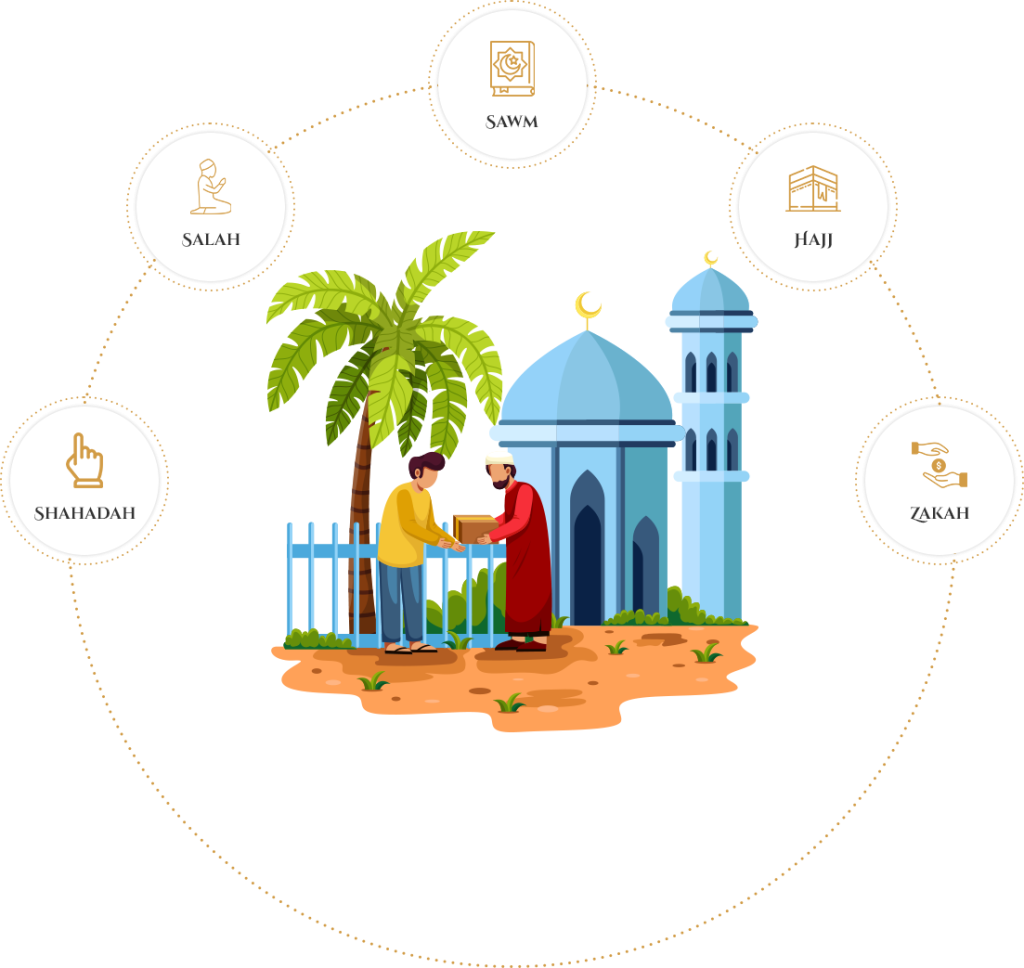
Please Wait For Loading

Please Wait For Loading



The Five Pillars of Islam: A Detailed Exploration in Accordance with Sunnah, Hadiths, and Islamic References. (SHOULD BE ADDED AS HYPERLINKS INDIVIDUALLY)
The Five Pillars of Islam are the core practices that define a Muslim’s faith and practice. These pillars are essential to Islamic worship and guide every aspect of a believer’s life. They form the foundation of Islam and must be adhered to by every Muslim. These Pillars of Islam are the foundational acts of worship that provide a comprehensive framework for a Muslim’s relationship with Allah and society. These pillars not only guide Muslims in their worship but also foster a sense of community, responsibility, and spiritual growth. By fulfilling these pillars with sincerity and devotion, a Muslim strengthens their connection with Allah and ensures a righteous and meaningful life. Each pillar has its roots deeply embedded in the teachings of the Quran and Hadith, and they collectively form the bedrock of a Muslim’s faith and practice.
Shahada is the fundamental declaration that signifies a Muslim’s faith. It is the testimony that there is no god but Allah, and Muhammad (Peace be Upon Him) is His Messenger. This declaration forms the core of Islamic belief.
Meaning and Importance:
Quranic Reference: "Say, 'He is Allah, [Who is] One. Allah, the Eternal Refuge. He neither begets nor is born, nor is there to Him any equivalent.'" (Surah Al-Ikhlas, 112:1-4)
This emphasizes the oneness of Allah, which is at the heart of the Shahada.
Hadith: The Prophet Muhammad (PBUH) said:
"Whoever says 'La ilaha illallah' (There is no god but Allah) sincerely, and dies upon it, will enter Paradise." (Sahih Muslim)
This Hadith highlights the significance of sincerely declaring the oneness of Allah and the Prophet Muhammad (PBUH) as His final messenger.
Salah refers to the five daily prayers that Muslims must perform at prescribed times throughout the day: Fajr (before dawn), Dhuhr (midday), Asr (afternoon), Maghrib (sunset), and Isha (night).
Meaning and Importance:
Quranic Reference: "Indeed, prayer has been decreed upon the believers a decree of specified times." (Surah An-Nisa, 4:103)
This highlights the obligatory nature of Salah and its designated times.
Hadith: The Prophet Muhammad (PBUH) said:
"The first thing a servant will be questioned about on the Day of Judgment will be his prayer. If it is good, then he will succeed; if it is bad, he will fail." (Sunan al-Tirmidhi)
This emphasizes the central role of Salah in a Muslim's life and its importance for success in the hereafter.
Zakah is the obligatory almsgiving, requiring Muslims to give a portion of their wealth to those in need. It is generally 2.5% of a person’s savings and investments over a lunar year.
Meaning and Importance:
Quranic Reference: "Take, [O Muhammad], from their wealth a charity by which you purify them and cause them to grow..." (Surah At-Tawbah, 9:103)
This verse emphasizes the purifying effect of Zakah on both the wealth and the heart of the giver.
Hadith: The Prophet Muhammad (PBUH) said:
"Islam is built upon five [pillars]: the testimony of faith, prayer, giving of Zakah, fasting in Ramadan, and performing Hajj." (Sahih al-Bukhari)
This Hadith affirms that Zakah is one of the fundamental pillars of Islam.
Sawm refers to the act of fasting, particularly during the month of Ramadan, when Muslims refrain from eating, drinking, and other physical needs from dawn to sunset. It is a time of spiritual reflection, self-discipline, and increased devotion to Allah.
Meaning and Importance:
Quranic Reference: "O you who have believed, decreed upon you is fasting as it was decreed upon those before you that you may become righteous." (Surah Al-Baqarah, 2:183)
This verse underscores the obligatory nature of fasting and its purpose of attaining taqwa (God-consciousness).
Hadith: The Prophet Muhammad (PBUH) said:
"Whoever fasts during the month of Ramadan out of faith and in the hope of reward will have his previous sins forgiven." (Sahih al-Bukhari)
This Hadith highlights the immense spiritual reward and forgiveness associated with fasting in Ramadan.
Hajj is the pilgrimage to Mecca, which every Muslim must perform at least once in their lifetime if they are physically and financially able. It is an act of worship that includes specific rituals and is performed during the Islamic month of Dhu al-Hijjah.
Meaning and Importance:
Quranic Reference: "And [due] to Allah from the people is a pilgrimage to the House – for whoever is able to find thereto a way." (Surah Al-Imran, 3:97)
This verse confirms that performing Hajj is an obligation for those who meet the criteria of ability.
Hadith: The Prophet Muhammad (PBUH) said:
"Whoever performs Hajj and does not engage in lewd speech or sinful behavior, will return [free of sin] as the day his mother bore him." (Sahih al-Bukhari)
This Hadith underscores the immense spiritual purification and reward of performing Hajj properly.

Ya Allah, please help me to be righteous and better Muslim. And please surround myself with nothing but kind-hearted and righteous people.Ya Allah please help me.